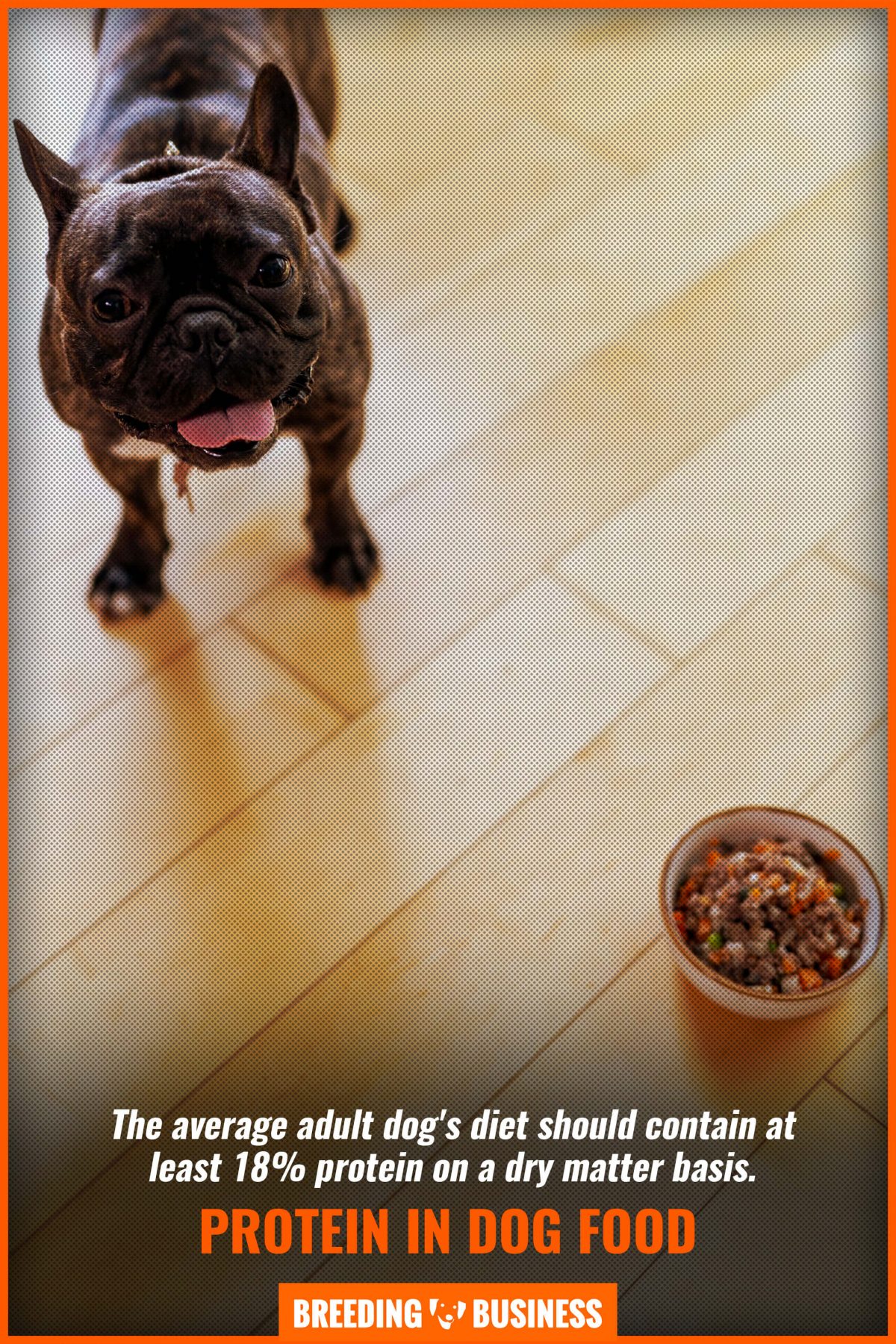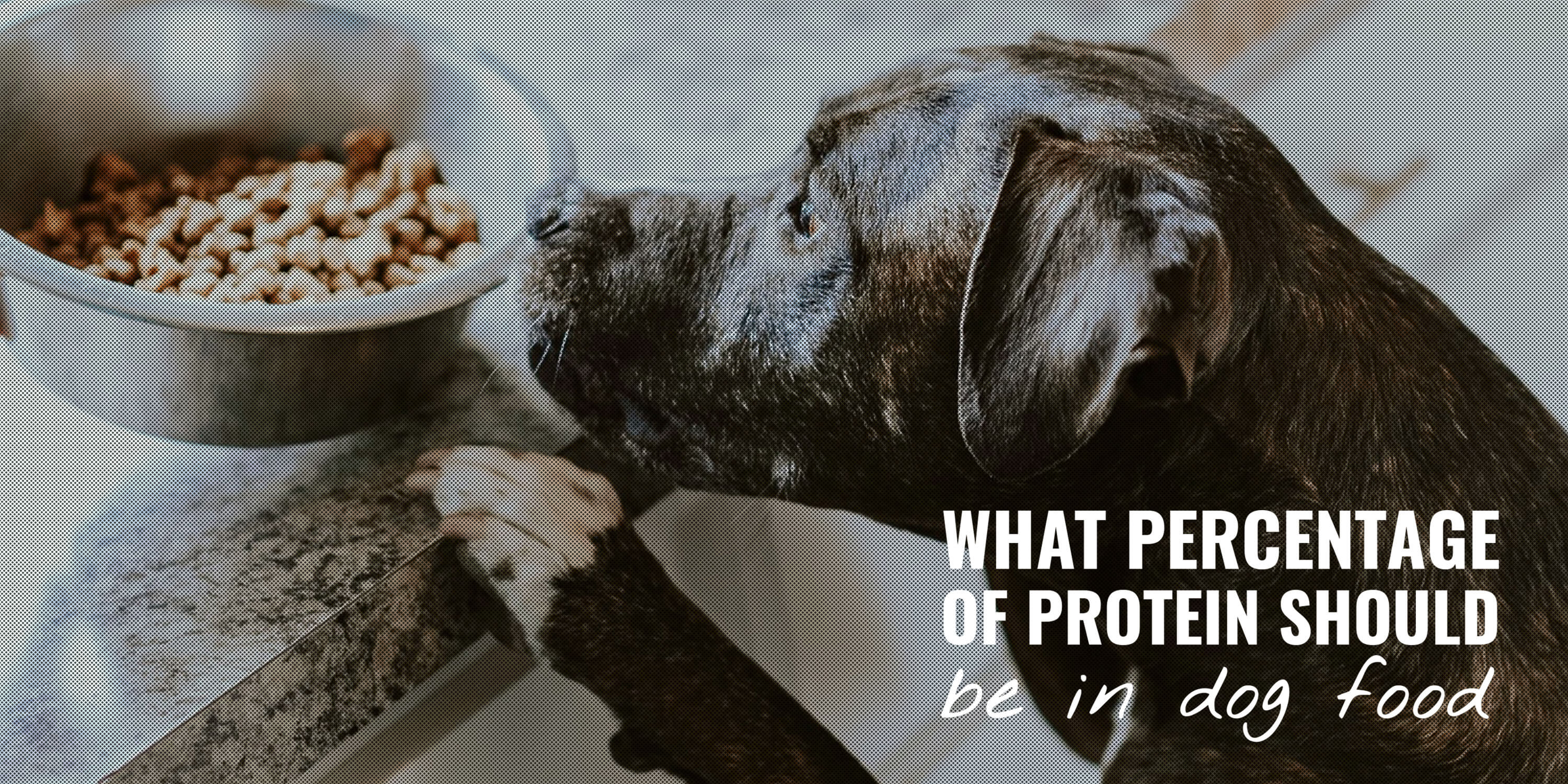As a doting dog owner, you might be wondering about the percentage of protein in dog food. Just like for people, protein is an important macronutrient for dogs and you must get the balance right to keep your pup healthy. But is it possible for dogs to have too much protein? And what could happen if your pooch doesn’t get enough protein? What does protein really do?
To fully understand the best dog food protein percentage, we must first discuss the role of protein in the body, where dogs get protein from, and which dogs need more protein than others. Ready to find out more? Read on with us!
Proteins are polymers of amino acids that have a diverse range of functions. But what exactly do they do? And why do dogs need them?
How Important Is Protein for Dogs?
Perhaps the most well-known function is the growth and maintenance of the body’s cells, allowing for the muscle to grow and for injuries to repair themselves.
Secondly, enzymes are proteins that cause chemical reactions to happen in the body – without dietary proteins, enzymes cannot function properly. Bodily functions that rely on enzymes include energy production, blood clotting, and muscle contraction.
Lastly, proteins are essential for transporting other nutrients around the body. For example, lipoproteins transport cholesterol and other fats through the blood, while hemoglobin, another protein, carries oxygen in the bloodstream. Protein can also have a storage role – ferritin, for example, stores iron. Overall, protein is absolutely essential for all dogs.
Research suggests that dogs are not carnivores, but are actually omnivores. Despite this, dogs still require a lot of protein in order to get enough amino acids.
What Percentage Of Protein Should Be In Dog Food?
The average adult dog’s diet should contain at least 18% protein on a dry matter basis. On the other hand, your puppy’s food should contain between 22.5% to 32% protein alongside other essential macronutrients. This is because puppies need a lot more protein to support their rapid muscle development and overall growth.
Without this protein intake, puppies are slow to grow and may struggle with skin lesions and a brittle coat. Pregnant and lactating dogs will also need this amount of protein to maintain their own bodies as well as to provide for their puppies.
Dogs who work or race will need more protein and fats to sustain their bodies. Your working dog needs more fat to increase its endurance, and more protein to reduce exercise-induced injuries. After vigorous exercise, a working dog should be fed within two hours to replenish its muscle stores, promoting endurance. Indeed, highly active breeds like the Border Collie may benefit from a diet containing 20% protein or more. Some premium working dog food ranges bump this amount up to 30% or more.

Best Sources of Protein for Dogs
Dogs can get their protein needs from different kinds of meat. However, since some dogs have allergies and intolerances, you have to make sure to only give them the food that they can have. Here are some good sources of protein for dogs:
- Beef
- Chicken
- Duck
- Fish
- Lamb
- Pork
- Rabbit
- Turkey
- Venison
Vegan dogs can get their protein needs from barley, buckwheat, chickpeas, green peas, oats, quinoa, and soy.
Quantity of Protein in Dog Food – FAQ
Have any questions about the percentage of protein in dog food? Feel free to browse our Frequently Asked Questions for more information. If in doubt about your dog’s diet, always ask your veterinary nutritionist for advice!
Protein is dense in calories, and as such, many high-protein dog foods are high in calories. This can lead to weight gain if your dog is not active or working, which goes on to cause obesity. Eating too much protein repeatedly can also strain the kidneys, leading to problems with dehydration.
Your vet will work with you to choose the best food for your dog whilst treating liver disease. You may notice that your dog’s food is lower in protein, but that its digestibility and quality are much higher. This is because the body needs enough protein to support liver healing. At the same time, excessive protein metabolic waste must be avoided. Through protein metabolism, nitrogenous wastes are produced – these are ammonia, urea, uric acid, and creatinine. Because the liver is damaged, these waste products cannot be removed effectively from your dog’s body. These waste products eventually travel to the brain, where they cause swelling and go on to affect the nervous system.
Very low protein intake can cause weak muscle tone, a thin coat, skin lesions, growth deficits, hormone imbalances, and edema due to fluid retention. Your dog may lose weight, find it difficult to put on weight, and be unable to produce enough milk when lactating. Lastly, dogs who don’t get enough protein may struggle with poor wound healing. Without protein to repair damaged cells, your dog’s wounds are unable to close as they normally would.
As well as protein, your pup needs carbohydrates and fats in their diet. These are macronutrients, which the body uses in large amounts every day. For example, the average adult dog should get between 30 and 70% carbohydrates from their food. Similarly, dogs should get 10 to 15% fat from their diet, with 5.5% being the minimum.
Your dog also needs micronutrients. Micronutrients are equally as important as macronutrients but are typically used in smaller amounts. Such nutrients include vitamins and minerals.
Muscle meats are some of the best sources of protein for dogs. Among the best meats are lean chicken, lean pork chops, lean lamb chops, and beefsteak. There is plenty of fish that is high in protein, too – among the highest protein contents are tuna, mackerel, salmon, and cod. Many types of grains, like corn or wheat, and oilseeds like soybeans provide plenty of protein.
If you look at your dog food label, you will probably find that your dog gets protein from one or more of these sources. This is because, as an omnivore, your dog does best when given protein from both animal and plant-based sources. Higher-quality dog foods will include additional sources of protein, like fish, eggs, wheat, or corn gluten to ensure that your pooch gets plenty of highly bioavailable protein.
Most vets recommend bland sources of protein for dogs with sensitive stomachs. This means that you should pick dog food with just one source of protein which is also highly digestible. Such diets might include chicken or turkey as the sole protein source. Dog foods containing probiotics may also be helpful for improving gut health.
Without question, protein is one of the most important macronutrients in your dog’s food. Finding dog food with highly digestible and high-quality protein sources will benefit your dog’s overall health and performance. To recap, your dog needs a diet containing at least 18% to 25% protein to be happy and healthy. In contrast, puppies need between 22.5% and 32% protein for growth.

